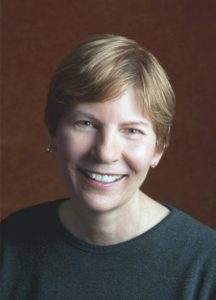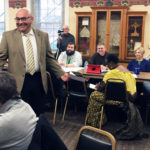Kathy Berken
If you’ve been going to Mass or reading this newspaper this year, you have heard and read many stories about mercy, Pope Francis’ theme for 2016. Dare I venture into that arena and give you another, perhaps surprising perspective?

We hear the words at the beginning of Mass, “Lord Have Mercy,” and again during the Communion Rite, “Lamb of God … have mercy on us.” We say the Jesus prayer, “Lord, have mercy on me a sinner,” and we may sometimes wonder where God’s mercy is in our suffering.
Strong’s Concordance defines mercy as “kindness or good will toward the miserable or afflicted, joined with the desire to relieve them.” An action word, mercy can mean compassion, forgiveness, understanding, kindness, assistance, acceptance, and other virtuous deeds. Mercy is fundamental to our corporal and spiritual works, so it’s less about talking and more about doing.
Because I hear the word mercy a lot, I need different phrasing to bring it home. I suggest the expression, “Give me a break!” Seriously, just give me a break from all this anguish, this suffering, this nightmare. When I say it that way, it feels much more authentic.
There’s a real sense of relentlessness in our distress. We say, “When will I stop hurting?” “I can’t stand all this fighting!” “Does it always have to be so painful?!” “Will he ever be well again?” Unless we are fortunetellers, doesn’t mercy always seem far away? Imagine Jesus on the way to Calvary. Mercy must have seemed very far away for him as he walked that hill. But we see Simon stepping in to carry Jesus’ cross and alleviate his suffering for a while. We see Veronica offering him a cloth to wipe his face. These are acts of mercy to give Jesus a break.
In the 1998 film, “City of Angels,” Meg Ryan plays a young surgeon, Dr. Maggie, who loses a patient in the operating room, and Nicholas Cage plays the angel Seth who sits in the stairwell with her and just gazes lovingly at her while she sobs. Maggie is unaware that Seth is there, so you might ask where she is getting a break from her pain. It’s true that she feels alone, but from our perspective as viewers, we see and feel Seth’s comforting presence. The film is fiction but certainly can offer some wisdom. I believe that when we suffer, we can know that there are angels, saints, God’s spirit with us, even though we can’t see them with our eyes.
More than anything, we desperately desire a break from our pain. We see others suffering and we want to help alleviate their misery. When mercy feels very far away from us or from those we love, what can we do, what hope can we have?
When my mom died in May 1974, my dad grieved more than I’ve ever seen anyone grieve. And no wonder. My mom was the kind of person anyone would want as a mother, and for the 24 years I had her, I would never have traded her for anyone else just to give me more time. Understandably, my dad wanted to die. His body shut down from the grief and, for him, mercy was beyond reach. However, my brother Don went back home after his discharge from the Navy. His presence and assistance was a great source of comfort and mercy to give our dad a break from his relentless suffering. Dad died less than two years later, a broken man, but having been cared for by Don whose mercy was perhaps something only he knew.
Pope Francis said, “Mercy is a word that can change everything, including the world.” Can you imagine what our world would be like if every person on the planet acted on that every day? In such a heightened awareness, we would be sure to see the face of God in everything everywhere.
(Kathy Berken has a master’s degree in theology from St. Catherine University, St. Paul, Minn. She lived and worked at The Arche, L’Arche in Clinton 1999-2009 and is author of “Walking on a Rolling Deck: Life on the Ark (stories from The Arch).”)










